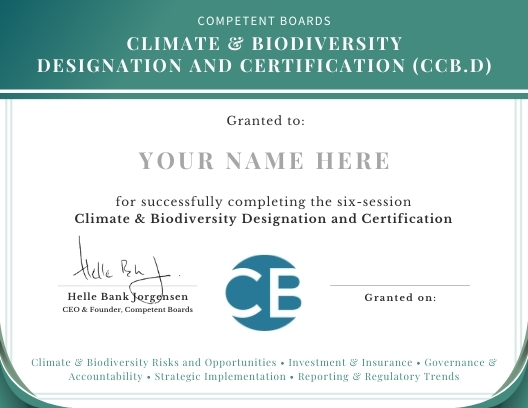Climate & Biodiversity Designation (CCB.D) and Certification
Gain the knowledge you need to effectively manage climate and biodiversity risks and opportunities, and get a modern credential to advance your career
Gain the knowledge you need to effectively manage climate and biodiversity risks and opportunities, and get a modern credential to advance your career

This program offers a safe learning environment led by renowned and engaging faculty speakers, and encourages global peer-to-peer discussions to tackle today’s most pressing boardroom challenges.
Climate competent board directors are urgently needed and studies show there is a gap in climate and biodiversity understanding, education and application to the business. Boards and business leaders don’t need to be climate experts, but as climate change oversight relates to a director’s fiduciary duty, up-to-date climate governance intelligence is imperative, and requires an integrated approach to strategy, reporting oversight, risk management, and adaptation.
This widely recognized global certification from Competent Boards will give you innovative tools and competitive strategies, familiarity with current and anticipated climate-related regulations through an international lens, and improved boardroom discussions on climate transition. Additionally, this program allows you and your board to differentiate its expertise and demonstrate your competency in disclosures to governments, investors, and other stakeholders.

Join us and equip yourself with the knowledge needed to effectively lead your company and improve resiliency – now, and in the future.
Get the credentials to satisfy IFRS S1 and S2 requirements for sustainability and climate governance at the board and management levels, as well as national regulations.
6 Sessions*
1.5 hours per session
FACULTY OF WORLD-RENOWNED EXPERTS
LIVE BI-WEEKLY INTERACTIVE DISCUSSIONS
DESIGNATION, CERTIFICATE AND CREDLY™ BADGE
global networking opportunities
CURATED TOOLBOX FOR EACH SESSION
This is a non-technical program for current and aspiring board directors of public, private, crown corporations, federal agencies and other non-government organizations.
*Due to the fluid nature of people’s schedules, we understand things come up and sometimes sessions are missed. If you can’t make a live session, you will have access to a recording so you don’t fall behind.












Please see program brochure for detailed session information.
If you still have questions, please contact us:
On March 6, the US SEC issued its final rule on climate risk disclosure. The US accounts for 42.5% of the global equity market capitalization (followed by the EU and China at ~ 11% each, and Japan at 5%).
This final rule elevates climate risk disclosures (and sustainable business management) from supplemental guidance issued by the SEC in 2010 to a formal rule with liability consequences that must be included in financial disclosures of public companies and those looking to go public (e.g., IPOs). This sends a signal to US companies that it is time to act, or accelerate progress, on materiality assessments, gap analysis, and a documented compliance plan for the enterprise.
Check out the on-demand version – same high-quality course materials, at your own pace. You have 1 year to complete it.
Primarily discuss the topics through the lens of serving on the board. You must be serving on at least one board with fiduciary responsibility to enter this stream.
Discuss the topics through a wide range of business perspectives (including the board) and comprise senior executives, investors, and board advisors.
Stay in the know with the latest sustainability, ESG and climate insights, plus be the first to learn about program updates and events.